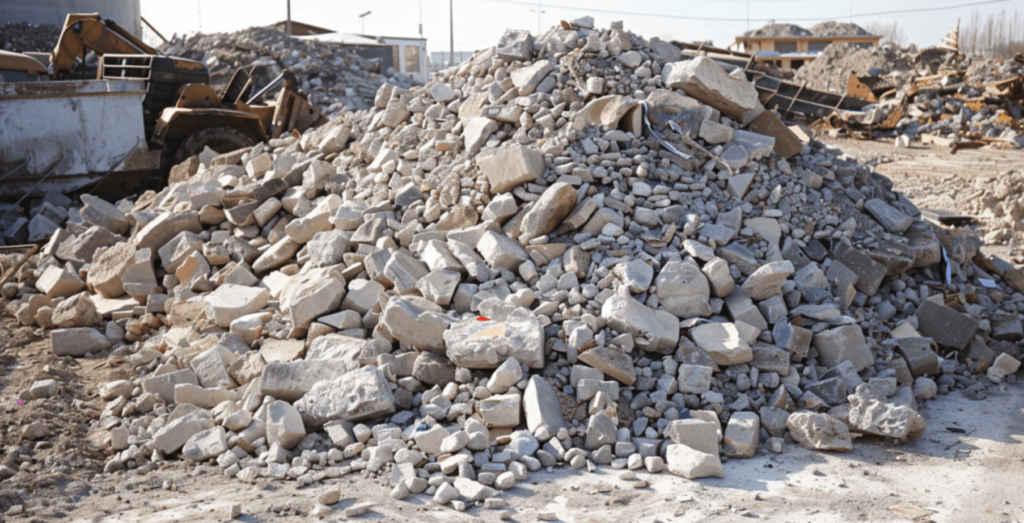Welcome to our article on advancements in shredding technology for industrial waste management. In today’s world, where sustainability is a key concern, finding effective waste reduction solutions is vital. Industrial waste management plays a crucial role in minimizing the environmental impact of industries. One of the key components of efficient waste management is high-capacity shredders.
High-capacity shredders are powerful machines that can handle large volumes of waste materials. They are designed to reduce the size of various waste materials, making them easier to dispose of or recycle. These innovative devices have revolutionized waste management practices, allowing industries to adopt more sustainable approaches.
Understanding Industrial Waste Management
In the realm of industrial activities, waste management stands as a critical aspect of sustainable operations. Effective industrial waste management involves properly handling and disposing of various types of waste generated by industries.
Industries generate a wide range of waste, including solid, liquid, and gaseous substances. Solid waste, such as packaging materials, production byproducts, and discarded equipment, poses significant challenges due to its volume and composition. Liquids, such as wastewater and chemical solvents, require careful treatment to avoid polluting water sources. Gaseous emissions, like fumes and exhaust, must be controlled to minimize air pollution.
The disposal of industrial waste presents numerous challenges. Improper waste management can lead to environmental contamination, health hazards, and ecological damage. Industries must navigate complex regulations to ensure compliance, avoid penalties, and safeguard public health.
Industries increasingly seek waste reduction solutions to address these challenges to minimize their environmental impact. These solutions emphasize sustainable practices and responsible waste disposal methods.
Some effective waste reduction solutions include:
- Recycling: Industries can implement recycling programs to reprocess waste materials and reduce the amount of waste sent to landfills. This can involve separating and sorting recyclable materials, such as metals, plastics, and paper, for processing and reuse.
- Composting: Organic waste, such as food scraps or agricultural residues, can be composted to create nutrient-rich soil amendments. Composting reduces waste, contributes to soil health, and promotes sustainable agriculture.
- Energy Recovery: Some waste materials can be converted into renewable energy sources through technologies like waste-to-energy systems. These systems generate electricity or heat by burning waste materials in controlled environments, reducing dependency on fossil fuels.
- Treatment and Neutralization: Industries can utilize treatment processes to neutralize hazardous waste substances, making them safer for disposal or recycling. These processes can involve chemical, physical, or biological treatments tailored to the specific waste characteristics.
Implementing these waste reduction solutions mitigates the environmental impact of industrial activities and brings economic benefits. By optimizing waste management practices, industries can reduce waste disposal costs, conserve resources, and enhance their reputation as environmentally responsible entities.
The Role of High-Capacity Shredders
High-capacity shredders play a crucial role in industrial waste management, offering practical solutions for waste reduction. These powerful machines are designed to handle large volumes of waste materials efficiently, making them indispensable in promoting sustainable waste management practices.
One of the key benefits of high-capacity shredders is their ability to reduce the size of waste materials. By shredding bulky items into smaller pieces, these machines facilitate easier disposal or recycling. This reduction in waste size not only maximizes storage space but also minimizes transportation costs, making waste management more cost-effective.
High-capacity shredders are versatile and can process various materials, including plastics, paper, cardboard, textiles, and wood. They are equipped with robust blades and cutting mechanisms that can efficiently break down various waste streams, further enhancing their effectiveness in waste reduction.
Benefits of High-Capacity Shredders:
- Enhanced efficiency: High-capacity shredders can handle large volumes of waste materials, streamlining waste management processes and increasing overall operational efficiency.
- Resource optimization: By reducing the size of waste materials, high-capacity shredders optimize storage space and enable more efficient utilization of available resources.
- Promotion of recycling: Shredded waste can be easily separated and sorted, facilitating recycling initiatives and contributing to a circular economy.
- Environmental sustainability: High-capacity shredders are vital in reducing landfill waste, minimizing environmental impact, and promoting responsible waste management practices.
High-capacity shredders have become an essential component of industrial operations with a growing emphasis on sustainable waste management. These advanced machines not only help businesses meet environmental regulations but also contribute to the creation of a greener future.
Shredding Construction Debris for Sustainable Practices
The construction industry generates significant waste, including construction debris, which poses several challenges in waste management. However, with the advent of advanced construction debris shredders, these challenges can be effectively addressed, promoting sustainable practices within the industry.
The use of construction debris shredders offers a sustainable solution for managing construction waste. These specialized machines are designed to process and recycle various types of construction debris, such as concrete, wood, metal, and plastics. By shredding the materials into smaller sizes, construction debris shredders facilitate easier disposal or recycling.
Shredding construction debris reduces the volume of waste and brings several environmental advantages. Firstly, it helps optimize landfill space, as the shredded materials occupy less volume, allowing for more efficient use of landfills. This reduces the need for new landfill sites and minimizes the environmental impact of waste disposal.
Secondly, construction debris shredders support recycling efforts within the construction industry. The shredded materials can be used as valuable resources in various applications. For instance, crushed concrete from shredded debris can be used as an aggregate in new construction projects or for road-based materials. Likewise, shredded wood can be used as biomass fuel or for manufacturing wood-based products.
The environmental benefits of shredding construction debris include:
- Reduction in landfill usage and the need for new landfill sites
- Promotion of recycling and resource conservation
- Minimization of carbon emissions associated with waste transportation
- Lower demand for raw materials through recycled construction debris
By adopting construction debris shredders as part of their waste management practices, construction companies can contribute to a more sustainable and environmentally conscious industry. These shredders help minimize waste generation and support the circular economy by promoting the reuse and recycling of construction materials.
Final Thoughts
In conclusion, the advancements in shredding technology have revolutionized industrial waste management, providing effective solutions for waste reduction. High-capacity shredders have proven crucial in efficiently handling large volumes of waste materials, reducing their size for easier disposal or recycling. These powerful machines contribute to sustainable practices and play a significant role in promoting environmental health.
Furthermore, construction debris shredders have emerged as game-changers in the construction industry. By effectively processing and recycling construction waste, these specialized shredders help minimize the environmental impact of construction activities. They enable the industry to embrace sustainable practices by transforming waste materials into valuable resources, reducing landfill waste, and conserving natural resources.
Investing in high-capacity shredders and construction debris shredders is vital for industries looking to achieve sustainable waste management practices. These cutting-edge technologies enhance waste reduction efforts and ensure compliance with environmental regulations. By utilizing these shredding solutions, industries can play an active role in safeguarding the environment and fostering a more sustainable future for generations to come.

